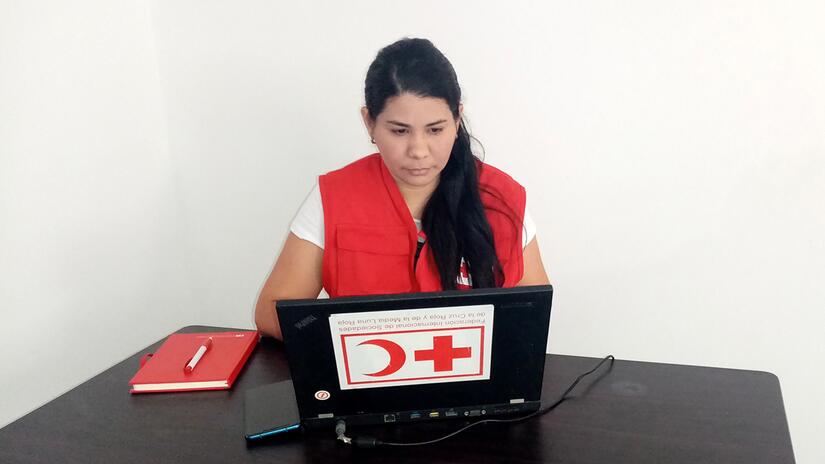It is a regular weekend. While many people rest, Doctor Roselbis Gonzáles wakes up, prepares breakfast for her 5-year-old daughter and her husband, takes her bottle of water and sits at the living room desk. There, she opens her computer and connects to the WhatsApp Support Line where she answers questions and calms the anxiety of many people who are full of concerns and doubts due to the crisis caused by the COVID-19 pandemic. The WhatsApp Support Line is an initiative of the International Federation of Red Cross (IFRC) that is developed in Peru.
Roselbis is part of the team of doctors and communicators who attend inquiries virtually through WhatsApp. The line receives daily questions about COVID-19, its symptoms, prevention measures, and general guidance for treating the disease. During the first two months of work, the platform has sent more than 19,600 messages to 874 users solving questions, fears and clarifying rumours about COVID-19.
For Roselbis, changing the person-to-person consultation for virtual attention became a challenge, “at the beginning I was a little hesitant, but in the end I liked it because I feel that I help to clear doubts and guide the population, especially migrants” The empathy that Dr. Gonzáles feels is due to the fact that she is also a migrant.
Roselbis was born in Venezuela country she had to leave three years ago to migrate to Perú "due to the economic, social and political crisis that is taking place". Her vocation to help others arose when she was in high school. “I was studying in a public school and many of my classmates were hungry, I always shared my breakfast with them,” she recalls. That motivation to help others led her to study medicine and although the first years of her career were very tough, she was not discouraged.
Today, with 8 years practicing as a doctor, she remembers every moment lived with "her little patients", as she refers to them fondly. One of the experiences that she remembers the most was the first time she attended a childbirth, "bringing a child to life is fixed on my mind, seeing the baby crying made me happy and marked my life”.
This help to pregnant women that she previously did face to face has now been transformed into virtual consultations. "I have attended several cases; the more common ones are pregnant women who tell me that their relatives have COVID-19 symptoms. They want to avoid becoming infected and that they have not been able to attend their medical check-ups, I wonder how people who live working day by day are doing, are they eating, how are they living”.
The IFRC WhatsApp Line answers various types of questions and populations, who want to find out about the symptoms and prevention measures of COVID-19. 49% of messages come from people in vulnerable situations, such as migrants (32%), people with chronic diseases (9%) and people with disabilities (8%).
While attending virtual consultations, Roselbis makes researches, reads the news and the latest reports from the World Health Organization, drinks water and eats a healthy snack. The WhatsApp Line attends messages every day from 08:00 to 18:00. This is how her shift goes, when she finishes registering her attentions, she joins her husband and daughter who play on the second floor of their house.
Article
World Radio Day: How radio helps keep communities healthy and safe
World Radio Day: How radio helps keep communities healthy and safe
| Article

